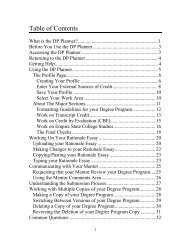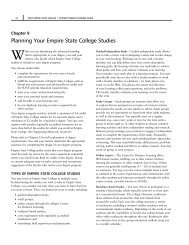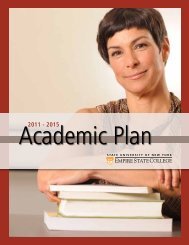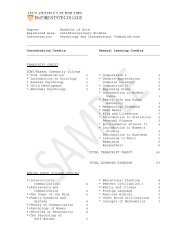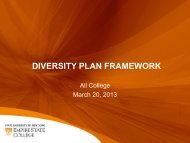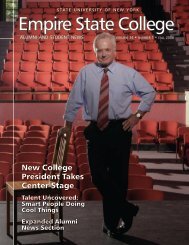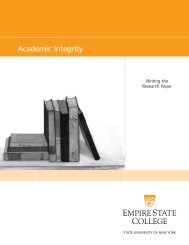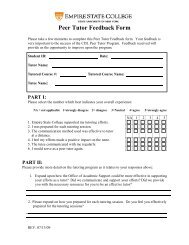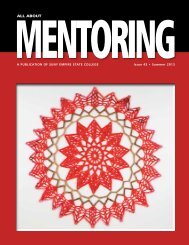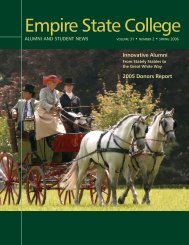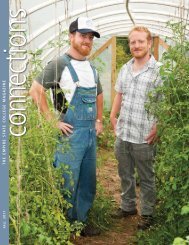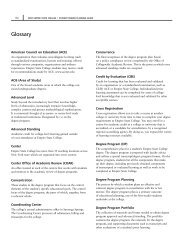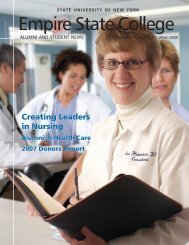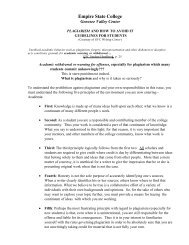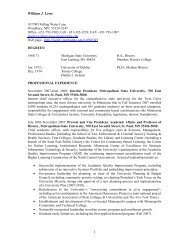All About Mentoring Spring 2011 - SUNY Empire State College
All About Mentoring Spring 2011 - SUNY Empire State College
All About Mentoring Spring 2011 - SUNY Empire State College
Create successful ePaper yourself
Turn your PDF publications into a flip-book with our unique Google optimized e-Paper software.
13<br />
Educating the Digital Citizen<br />
in the 21st Century<br />
Nicola Marae Martinez, Center for Distance Learning<br />
I. Prologue<br />
A headline caught my eye recently while<br />
browsing a local bookstore. Foreign Affairs<br />
had a leading story titled: “The Political<br />
Power of Social Media: Communications<br />
Technology Will Help Promote Freedom but<br />
it Might Take a While” (Shirky, <strong>2011</strong>). One<br />
might have thought that the article referred<br />
to current historic events taking place all<br />
over the Middle East and Africa, but in fact,<br />
the article pre-dates recent uprisings and<br />
covers a wide range of political and social<br />
movements for which social media have<br />
been instrumental. The author points<br />
out that:<br />
Since the rise of the Internet in the<br />
early 1990s, the world’s networked<br />
population has grown from the low<br />
millions to the low billions. Over the<br />
same period, social media have become<br />
a fact of life for civil society worldwide,<br />
involving many actors – regular citizens,<br />
activists, nongovernmental organizations,<br />
telecommunications firms, software<br />
providers, governments … . (p. 28)<br />
Recent political uprisings with citizen<br />
protest in Tunisia, Egypt and other Middle<br />
Eastern countries reflect a new level of mass<br />
mobilization using mobile and social media.<br />
These media are shaping domestic and<br />
foreign political agendas, affect our privacy<br />
and security, and are changing the nature of<br />
individual autonomy and freedom. We have<br />
entered an information era in which the<br />
teaching and learning of these media should<br />
be critically embedded in the educational<br />
program, with careful consideration given<br />
to ethical, privacy and security concerns.<br />
Digital media literacy is a critical component<br />
of civil society in the 21st century.<br />
One of my strong interests as an educator<br />
is to encourage autonomy among adult<br />
learners. Understanding adult agency and<br />
autonomy are strong underlying themes in<br />
my own scholarly work. In the 21st century,<br />
agency and autonomy are intrinsically linked<br />
to our ability to be informed digital citizens.<br />
In my course, Privacy, Security, Freedom:<br />
Social Concerns for the 21st Century, we<br />
cover the implications of living in a world<br />
within digitally mediated surveillance;<br />
technology tracking tools; dataveillance;<br />
and a wide range of threats to privacy,<br />
security and civil liberties. In addition to<br />
researching these topics from philosophical,<br />
policy analysis, legislative and current events<br />
perspectives, students debate the balance<br />
necessary to uphold individual privacy<br />
and civil liberties within an era of ongoing<br />
security risks. The role of the student as<br />
actor and agent, within various degrees<br />
of autonomy, reveals the potential for the<br />
development of both personal and political<br />
autonomy as the course unfolds. Students<br />
comment on their learning:<br />
• “After learning the information I have<br />
learned in this course, I am eager to<br />
make a difference either in how I vote,<br />
what corporations I support, or even to<br />
be more informed about our nation and<br />
our government. I have really grown<br />
to appreciate academic and scholarly<br />
sources. Our media and news stories have<br />
such a slant on them that it’s difficult for<br />
anyone to know the truth.”<br />
• “Our group as a whole was introduced<br />
to some of the most complicated issues<br />
facing citizens and government today.<br />
We explored, analyzed, researched and<br />
even debated acts of legislation, political<br />
and social commentary, not to mention<br />
philosophy. Our eyes were opened to<br />
the various issues facing modern society;<br />
privacy, security, terrorism and cultural<br />
awareness were only some of the topics<br />
we delved into.”<br />
In a world in which our media is dominated<br />
by a very small handful of new sources<br />
that provide the same account of events to<br />
subscribers, assessing alternative sources<br />
of news and information is essential. This<br />
is where social media tools are becoming<br />
indispensable for the everyday citizen as well<br />
Nicola Marae Martinez<br />
as for the educator. Instant access to news<br />
from a number of international sources<br />
provides us with a deeper understanding<br />
of events and a variety of viewpoints. In<br />
addition, the ability to analyze, create<br />
and disseminate content using a wide<br />
range of social and digital media tools is<br />
becoming a necessary literacy for the 21st<br />
century citizen. Emerging research, along<br />
with increased interest from our students,<br />
highlight the importance of educating for<br />
digital media literacy.<br />
II. Why Digital Media Literacy<br />
According to the New Media Consortium<br />
Horizon Report for 2010 and <strong>2011</strong>,<br />
“Digital media literacy continues its rise in<br />
importance as a key skill in every discipline<br />
and profession” (p. 3). In fact, digital media<br />
literacy is consistently listed as the top<br />
challenge in this report on emerging trends<br />
and challenges in higher education. The<br />
2010 Horizon Report discusses the difficulty<br />
of encouraging digital media literacy among<br />
faculty as well as students. The primary<br />
difficulty is the problem of educating faculty<br />
so that they feel prepared to share this<br />
learning with students and to allow students<br />
suny empire state college • all about mentoring • issue 39 • spring <strong>2011</strong>



